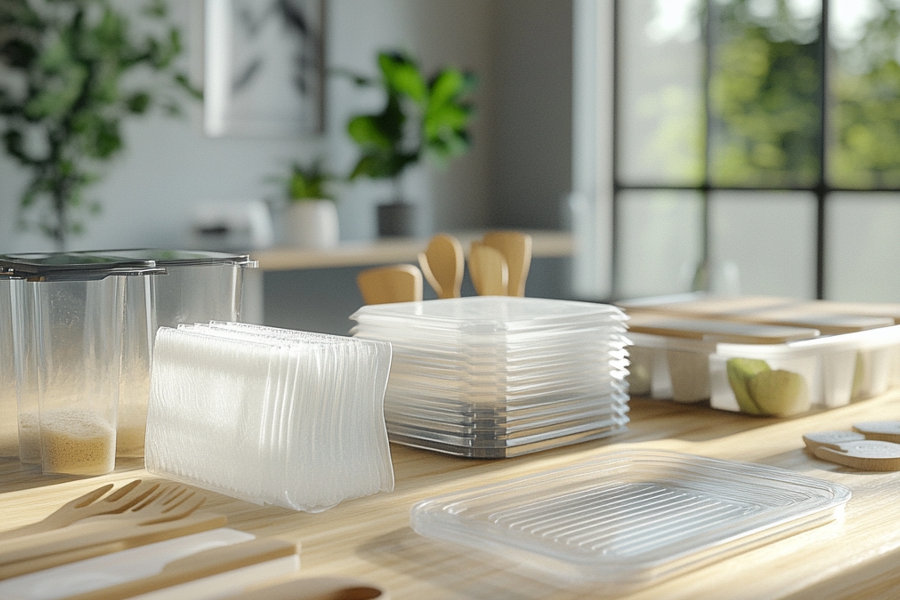Understanding Starch-Based Plastics in Sustainable Packaging

Starch-based plastics are an increasingly popular alternative to traditional petroleum-based plastics, offering an eco-friendly solution in the world of packaging. Derived from natural starch sources such as corn, potatoes, and wheat, these bioplastics are biodegradable and can break down more easily than conventional plastics, making them a crucial part of sustainable packaging initiatives. As environmental concerns and consumer demand for green solutions grow, starch-based plastics have become a focal point for industries looking to reduce their carbon footprint and environmental impact.
What Are Starch-Based Plastics?
Starch-based plastics are polymers derived from natural starch, which is a renewable resource. The process typically involves extracting starch from plants, converting it into a bioplastic material that can then be moulded into packaging, containers, and films. These bioplastics offer similar properties to traditional plastics, such as flexibility and durability, but with the added benefit of being biodegradable under the right conditions.
One of the most widely used forms of starch-based plastic is thermoplastic starch (TPS), which can be mixed with other biodegradable polymers to enhance its properties. TPS can be used on its own or blended with other materials to create packaging that decomposes naturally, reducing the long-term impact of plastic waste.
Applications of Starch-Based Plastics
Starch-based plastics are used across a variety of sectors, particularly in industries where sustainability is a priority. They are commonly used in:
-
Food Packaging: Starch-based plastics are ideal for food packaging due to their biodegradable nature and ability to create airtight seals, helping to preserve food while reducing packaging waste.
-
Disposable Items: Products like biodegradable cutlery, plates, and straws are often made from starch-based plastics, offering a sustainable alternative to single-use plastic items that typically end up in landfills.
-
Agriculture: Starch-based plastics are used in biodegradable films for agriculture, helping to reduce plastic pollution while providing the necessary protection for crops.
-
Medical Packaging: In the healthcare industry, starch-based plastics are increasingly being used for disposable medical items, reducing the environmental impact of waste.
Advantages of Starch-Based Plastics
One of the primary benefits of starch-based plastics is their ability to break down into natural elements. Unlike traditional plastics, which can take hundreds of years to degrade, starch-based plastics decompose much more quickly, depending on the conditions they are exposed to. In industrial composting facilities, they can break down in a matter of months.
Additionally, starch-based plastics are made from renewable resources, reducing the reliance on fossil fuels. The use of crops such as corn and potatoes means that the raw materials are replenishable, helping to reduce the environmental impact associated with petroleum extraction and plastic production.
Starch-based plastics also help businesses align with increasingly stringent environmental regulations. As governments worldwide introduce stricter measures to curb plastic waste, the use of biodegradable alternatives allows companies to comply with regulations and improve their sustainability profiles.
Challenges of Starch-Based Plastics
While starch-based plastics offer significant environmental benefits, they also present some challenges. One issue is the production cost, which is often higher than that of conventional plastics due to the cost of raw materials and the complexity of production processes. This can make starch-based plastics less economically viable for certain applications, particularly when compared to cheaper, mass-produced petroleum-based plastics.
Additionally, the biodegradability of starch-based plastics is dependent on specific conditions. For instance, they may not break down as quickly in natural environments as they do in industrial composting facilities. If disposed of improperly, starch-based plastics could still contribute to landfill waste, although they will eventually degrade faster than traditional plastics.
Future Trends in Starch-Based Plastics
As technology advances, the future of starch-based plastics looks promising. Research is ongoing to improve the performance of starch-based plastics, making them more versatile and cost-effective. Innovations such as blending starch-based plastics with other biodegradable polymers are helping to expand their range of applications, making them suitable for more demanding uses.
There is also a growing focus on developing fully compostable plastics, which can break down completely in both industrial composting facilities and natural environments. As consumer demand for eco-friendly products continues to rise, starch-based plastics are likely to play an increasingly important role in the future of sustainable packaging.
Summary
Starch-based plastics represent a key advancement in the quest for sustainable packaging solutions. By offering a biodegradable and renewable alternative to conventional plastics, they help reduce the environmental impact of plastic waste while providing the functionality needed for a wide range of packaging applications. As industries continue to embrace sustainable practices, starch-based plastics are set to become an integral part of the packaging landscape.
At Jacob White Packaging, we understand the importance of sustainability in packaging and are committed to supporting businesses in their efforts to adopt eco-friendly solutions. Our expertise in packaging technologies ensures that your products are packaged efficiently and responsibly, helping you meet the growing demand for environmentally conscious products. For more information on how we can support your packaging needs, contact Jacob White Packaging today to discuss the best sustainable solutions for your business.

